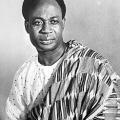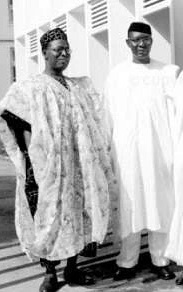103. A Federal Case: Nnamdi Azikiwe and Obafemi Awolowo
Two Nigerian activists lead the struggle for independence, and clash over the competing values of national unity and ethnic diversity.
Themes:
• O. Awolowo, Path to Nigerian Freedom (London: 1947).
• O. Awolowo, Awo: the Autobiography of Chief Obafemi Awolowo (Cambridge: 1960).
• O. Awolowo, Thoughts on Nigerian Constitution (Ibadan: 1966).
• N. Azikiwe, Renascent Africa (London: 1968, originally published 1937).
• N. Azikiwe, My Odyssey: an Autobiography (New York: 1970).
• N. Azikiwe, Zik: a Selection from the Speeches of Nnamdi Azikiwe (Cambridge: 2010).
---
• O. Abegunrin, The Political Philosophy of Chief Obafemi Awolowo (Lanham: 2015).
• W. Adebanwi, Yoruba Elites and Ethnic Politics in Nigeria: Obafemi Awolowo and Corporate Agency (New York: 2014).
• W. Adebanwi, “Contesting Multiculturalism: Federalism and Unitarism in Late Colonial Nigeria,” in R.T. Ashcroft and M. Bevir (eds), Multiculturalism in the British Commonwealth: Comparative Perspectives on Theory and Practice (Oakland: 2019), 167-90.
• M.A. Makinde, Awo as a Philosopher (Ife-Ife: 2002).
• I. Nolte, Obafemi Awolowo and the Making of Remo: the Local Politics of a Nigerian Nationalist (Edinburgh: 2009).






Comments
Consociationalism
I loved this episode. I can't pick a favourite, but this has to be top ten, if only because it intersects so much with my own work on post-war governance. Consequently, I have a lot of thoughts, so I will just stick to two:
1) If I'm ever in a position of writing a curriculum, I will use Nnamdi Azikiwe and Obafemi Awolowo's works to illustrate the arguments for and against consociationalism, or ethnic/confessional federalism. I had not realised—and feel stupid for not realising—that these debates would have raged in Africa among Africans long before the key texts were published in Western Academia following the rise of peacebuilding interventions after the Cold War. The same can be said for the increasing movement away from universalistic models of governance, or at the most creating a set of models to apply based on categorisations of contexts, toward paying more than lip-service to local needs and traditions.
2) On the subject of that Western Academia, one strong strain in the consociationalism literature is about breaking down the incentives and disincentives for political actors in different institutions. A pertinent question for Awolowo would be how to sustain a national, pan-Nigerian commitment if local politicians have local power bases. They would be incentivised to wrest more power and influence from the centre and exploit ethnic tensions to legitimise such actions—as indeed we are seeing with Nigeria's regional conflicts in 2022. The literature has its own, normally rather inward looking answers. What answers do African(a) philosophers come to? I would be fascinated to trace this debate through the ongoing constitutional struggles of post-independence Africa. What insights can they give to the violence between unitary and federalist movements in Ethiopia or the dictatorially imposed non-ethnic identity in Rwanda?
(Secret third: there's also an interesting blurring of the line between social science and philosophy here. Not suggesting that social science isn't normative, but here the very same questions are being treated with very similar tools.)
In reply to Consociationalism by Isaac of York
Zik and Awo
Thanks! So glad you liked the episode. Given your interests you will probably also get a lot out of the next one (which just went up today) on Nkrumah.
In reply to Consociationalism by Isaac of York
African consociationalism
I study consiciationalism and must confess that it also took me a while to appreciate its African roots. If you haven't already, check out Sir Arthur Lewis's Politics in West Africa - Lijphart cites it as a precursor to his own work and it clearly left a strong impression on early consociational research among European political scientists in the 60s.
Add new comment